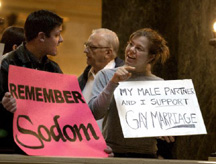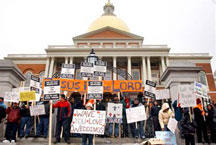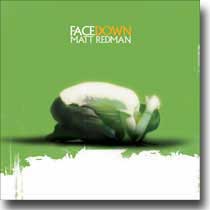| |
Same-Sex Marriage:
A Sober Assessment of the Arguments
by Rev. Dr. Mark D. Roberts
Copyright © 2004 by Mark D. Roberts
Note: You may download this resource at no cost, for personal use or for use in a Christian ministry, as long as you are not publishing it for sale. All I ask is that you give credit where credit is due. For all other uses, please contact me at mark@markdroberts.com . Thank you.
Same-Sex Marriage:
Three Indisputable Facts and One Undeniable Need
Part 1 in the series "Same-Sex Marriage: A Sober Assessment of the Arguments"
Posted at 10:30 p.m. on Thursday, July 15, 2004
With the recent Senate vote in the books, there won’t be an official move anytime soon to amend the U.S. Constitution so as to protect traditional marriage. But this certainly won’t stop the debate about whether this country should officially endorse same-sex marriage or not. As I’ve listened to this debate, I’ve come to three conclusions that I take to be beyond dispute. From these I derive one need that seems to be equally clear. I expect that sober thinkers on all sides of this issue will agree with me on the following:
Indisputable Fact #1: There is a wide range of opinion in our country about same-sex marriage.
| Though polling data show that the majority of Americans oppose legalizing same-sex marriage, there still remains a substantial minority on the other side. Moreover, when you consider not merely the question of legality, but the question of how U.S. law should deal with same-sex marriage, you get even wider diversity of opinion. So, as we have seen recently, many who do not support same-sex marriage also do not support changing the constitution to define marriage as between one man and one woman only. |
|
| |
Widely ranging viewpoints! |
Indisputable Fact #2: This issue won’t be going away anytime soon.
No matter what happens in the legislatures and law courts of our land, the debate about same-sex marriage will be with us for years, if not for decades, if not forever. The analogy with abortion is an apt one. It’s been over thirty years since the U.S. Supreme Court handed down the decision in Roe v. Wade, but time hasn’t squelched debate on the morality and legality of abortion. Given that views of marriage and homosexuality, like views on abortion, usually reflect deeply held beliefs and engage deeply felt passions, we might as well buckle up our seat belts and get ready for a long, circuitous, roller-coaster ride of public debate.
Indisputable Fact #3: Much of the debate on same-sex marriage is so filled with hyperbole and vitriol that clarity about the real issues and presentation of genuine evidence is hard to find.
Even if you have a strong opinion about this issue, you must admit that most of the primary spokespeople in the debate – even on your side – have been throwing rhetorical hand grenades, if not nuclear weapons. Both sides make grandiose claims while dismissing the equally grandiose claims of their opponents more with cheap sound bites than with rational argumentation and solid evidence. Of course the news media doesn’t help much here, because they’re usually not looking for sane advocates, but rather for hyperbolic incendiaries. Sane advocates don’t gain the audience share that sells advertising.
Undeniable Need #1: Given the indisputable facts outlined above, I’m led to an undeniable need: for a clear, sensible presentation of the main arguments for and against same-sex marriage, combined with an equally clear, sensible presentation of the objections to these arguments.
Of course rabid ideologues on either side of this issue won’t agree with me about this need and its undeniability. Either they’ll insist that their exaggerations are in fact clear and sensible, or they’ll object to a clear and sensible presentation of the other side’s case, or both. But I’m not particularly concerned about the rabid ideologues because nothing will alter their opinions, including logic and evidence. But I am concerned for a vast number of Americans – I believe, a clear majority – who would really like to find a trustworthy presentation of the salient points in the same-sex marriage debate. I know I’d like to see such a presentation, and I know I’m not alone in this.
I’ve spent a good bit of time looking for such a balanced, concise, and preferably online treatment of the arguments for and against same-sex marriage. So far I’ve struck out. If you are aware of such a source, I’d be more than happy to learn about it and, if it seemed reliable to me, to promote it on this website. But, in the meanwhile, I propose to start developing such a resource myself. This won’t be something I’ll finish in the next week or so, or even in the next couple of months. I see it as an ongoing, evolving project. But, if I’m right about the potentially endless nature of this debate, then I have plenty of time to produce a succinct, comprehensible, and fair guide to the arguments.
If you’re interested in this project, you can help in several ways. First, you can send me your ideas, preferably in a carefully-written and rather brief format. Second, you can refer me to books or articles that you have found to be particularly helpful. Third, you can send me to Internet links that are truly informative. Fourth, as I publish arguments, and then as I publish objections, you can chip in your two cents. (Ah, yes, a writer’s nightmare: thousands of editors!)
Of course you may be wondering if this whole project is simply a façade. Perhaps my hidden agenda is to promote my particular viewpoint. Of course there’s always a danger that I can’t be objective enough. But there are a few safeguards that should help me to be relatively balanced and fair. First, by putting up my thoughts in a public forum, I’ll get lots of input from people who disagree with me. This will sharpen my ideas and augment their fairness. Second, there are people in my life whom I deeply respect who are on the other side of this issue from me. If I can listen to them, then I’ll be preserved from undue bias. Third, I really do want to test my own convictions with reasonable arguments and evidence. I want to make sure that what I believe is right, to the extent that I can determine it.
In case you’re wondering, I’ve gone on the record against legal recognition of same-sex marriages. I don’t oppose same-sex couples making lifetime commitments to each other. And I think same-sex couples deserve many of the privileges and protections afforded to traditional married couples. But I also think that the potential dangers to society in government endorsement of same-sex marriage outweigh the potential benefits to society. However, I’m ready to weigh my convictions in the scales of reason.
By the way, I'm not concerned in this context about the religious questions about the rightness or wrongness of homosexual behavior, except insofar as these are relevant to the secular, legal questions. So, for example, I am not planning in this series to examine the biblical arguments about homosexuality that plague my denomination in its national meetings.
I can’t tell you how often my daily blog will address this issue. If you’re interested, you should check back every now and then. As always, I’ll collect all my posts in a series that will be linked in the left column so you can easily access them.
The next installment in this series will come on Monday. So stay tuned.
Home
The Case for Same-Sex Marriage: Argument #1
Part 2 of the series: “Same Sex Marriage: A Sober Assessment of the Arguments”
Posted at 10:30 p.m. on Sunday, July 18, 2004
In my first post in this series I proposed to begin a sober assessment of the arguments for and against same-sex marriage. It's not that I don't have my own opinion about what's right and wrong here, but I am eager to lay out arguments in a way that might help all of us to think more clearly and soberly about this crucial issue. I asked for your help in directing me to solid, thoughtful statements on both sides of the debate. Many of you have sent your own reflections or links to the insights of others. Thank you! These have been helpful. I hope you’ll continue to let me know what you think and what you have found to be persuasive. My goal is to have the information on this website be as clear, fair, and helpful as possible.
Sometimes clarity isn’t particularly stunning or newsworthy, however. I think this is one of the reasons we don’t find much of it in the media. But since I have nothing to sell, I don’t have to try to entertain you. This means that what you read on this website will sometimes seem painfully obvious. But, as I tell my seminary students when I teach biblical exegesis, sometimes it's both right and important to say what's obvious.
I mention this because the argument you’ll read below won’t stun you with its novelty. No doubt you’ve heard it before, many times. Nevertheless it is, in my opinion, the most common argument in favor of same-sex marriage. In fact, it often presented less as an argument, for which evidence is due, and more as a self-evident axiom, something that every reasonable person should be able to affirm without much intellectual effort.
Argument for Same-Sex Marriage #1: The right to marry whomever one wishes to marry is a fundamental civil right, and should not be denied to people who wish to marry someone of the same gender.
Wherever you hear someone defending same-sex marriage, you hear the language of basic human rights. This is true in both in the popular media and in the courts. Andrew Sullivan, for example, one of the most intelligent advocates of same-sex marriage, quotes the philosopher Hannah Arendt on his website:
The right to marry whoever one wishes is an elementary human right compared to which 'the right to attend an integrated school, the right to sit where one pleases on a bus, the right to go into any hotel or recreation area or place of amusement, regardless of one's skin or color or race' are minor indeed. Even political rights, like the right to vote, and nearly all other rights enumerated in the Constitution, are secondary to the inalienable human rights to 'life, liberty and the pursuit of happiness' proclaimed in the Declaration of Independence; and to this category the right to home and marriage unquestionably belongs. (Hannah Arendt, Dissent, Winter 1959)
|
|
| |
Hannah Arendt (1906-1975)
|
Though Dr. Arendt was writing about laws that limited interracial marriage, not same-sex marriage, her statement rings true for those engaged in the current debate.
On the judicial side, the language of rights fills the decision of the Massachusetts Supreme Court that has poured gasoline on the fire of advocacy for same-sex marriage. In Goodridge v. Department of Public Health, the court listed out many of the legal benefits of marriage. Then it concluded:
It is undoubtedly for these concrete reasons, as well as for its intimately personal significance, that civil marriage has long been termed a "civil right." (emphasis added)
Moreover, the court argued:
Without the right to marry--or more properly, the right to choose to marry--one is excluded from the full range of human experience and denied full protection of the laws for one's "avowed commitment to an intimate and lasting human relationship." (emphasis added)
|
|
| |
A rally for and against same-sex marriage on the steps of the Massachusets Statehouse in Boston.
|
Finally, the court added:
The right to marry means little if it does not include the right to marry the person of one's choice, subject to appropriate government restrictions in the interests of public health, safety, and welfare.
Justice John M. Greaney of the Massachusetts Supremes contributed a concurring opinion, in which he argued that the Declaration of Rights in the Massachusetts Constitution
guaranteed to all people in the Commonwealth--equally--the enjoyment of rights that are deemed important or fundamental. The withholding of relief from the plaintiffs, who wish to marry, and are otherwise eligible to marry, on the ground that the couples are of the same gender, constitutes a categorical restriction of a fundamental right (emphasis added).
In other words, Justice Greaney continued, “The right to marry is not a privilege conferred by the State, but a fundamental right that is protected against unwarranted State interference” (emphasis added). Therefore the government can only restrict one’s basic right to marry, according to the court’s decision, “in the interests of public health, safety, and welfare.” Of course this qualification of individual rights raises some interesting question we'll want to deal with later on.
If you happen to think of marriage as something that necessarily involves a man and a woman, not two men or two women, the court's discussion of the right to marry sounds silly. The court seems to assume their conclusion that marriage can be between members of the same sex. In fact the court redefined marriage, setting aside as incidental the notion that marriage must include one person of each sex: “We construe civil marriage to mean the voluntary union of two persons as spouses, to the exclusion of all others.” Not one man and one woman, but any two persons. The court intentionally rejected the classic common-law definition of marriage as between a man and a woman, arguing that this is what courts are empowered to do, and so they did it.
The “fundamental civil right argument” does more than claim that two people of the same sex have the right to make an exclusive, lifelong commitment to each other. They can do this right now without government restriction. This argument also insists that same-sex couples have a right to have their relationships recognized by the government, and to enjoy all of the legal protections and benefits accorded to traditional male-female marriages.
I will stop here for now. I hope I have fairly presented this argument for same-sex marriage. If you think I have been either unfair or unclear, please let me know. If you’re worried that I haven’t presented evidence for this argument, or that I haven’t presented contrary arguments, you’ll have to be patient. I’ll take this up again in due time, though my schedule won’t give me that time in the next several days. Like I said in my first post, I see this as a long term project.
Home
|






